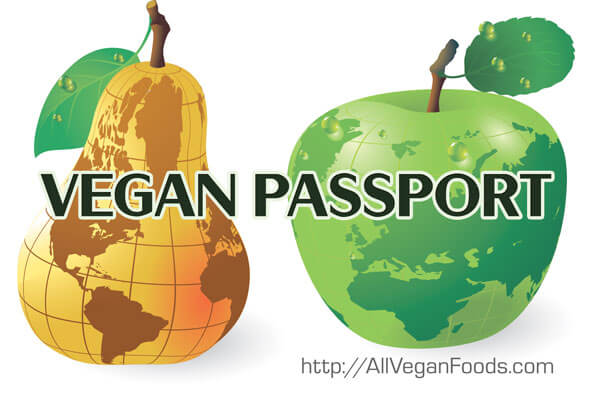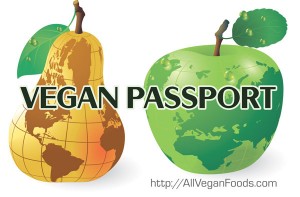
by Michaela Kennedy | Jul 7, 2014 | Lifestyle
 A vegan passport might just smooth out and enrich your travel experience. Traveling, seeing the world, getting to know foreigners, and eating all sorts of exciting, delicious foods seems so exciting… but it's not always easy being a vegan, trying to explain what not to put in your food. The answer to the problem is right here.
A vegan passport might just smooth out and enrich your travel experience. Traveling, seeing the world, getting to know foreigners, and eating all sorts of exciting, delicious foods seems so exciting… but it's not always easy being a vegan, trying to explain what not to put in your food. The answer to the problem is right here.
What's a vegan passport?
A “Vegan Passport” that explains in detail, to your waiter or chef, what you want to eat and what you will avoid.
There are two ways to do it. Either way, it covers over 95 percent of the world's population with its 74 languages. I love this new era of instant information! I did plenty of shoestring travel throughout Asia when I was younger, and I often ate things I had no idea what they were or what was in them. I'm not too sure how well I would have fared as a vegan back then. But in the five years that I've now committed to a vegan lifestyle, the internet has grown in vegan information, too.
Vegan passport to easy travel
Below are a couple of choices to help you:
1. You can buy the travelers guide online: The Vegan Passport cost is in paperback and also has a mobile app for easy reference.
2. If you are more into do-it-yourself or not traveling that much, you can print travelers cards you can fold and have in your wallet. Go to vegan cards – there are over 100 languages, so you can choose to print the language(s) you need.
It's a true blessing to have this kind of support with you when you are sitting in a local restaurant in a foreign land and you don't know the language that well.
As always when you are abroad and wish to find a vegan restaurant or cafe use Happy Cow's list – it's far the best I've seen and I use it every time I travel.
Have a nice trip!

by Michaela Kennedy | Nov 15, 2013 | Health
 Are you thinking about changing your diets? Do you see the rise of veganism and do not understand the reasons why some people choose to go vegan? While changing to a different diet could be a personal choice and has no specific reason, here are five top reasons why to switch to veganism.
Are you thinking about changing your diets? Do you see the rise of veganism and do not understand the reasons why some people choose to go vegan? While changing to a different diet could be a personal choice and has no specific reason, here are five top reasons why to switch to veganism.
Animal rights
Many vegans attribute the change in their diet to counteract animal cruelty and as an opposition to killing animals for food. This is becoming more relevant recently as industrialised food production has reduced animals to basic confined objects in very crowded spaces and some harsh and inhumane conditions. There is also the simple reason that animals are living being and should not be exploited and killed for human consumption.
Environmental concerns
Raising cattle and other animals primarily for food production produces a high level of methane gas that has very severe environmental ramifications. In addition to that, raising animals for meat and dairy production requires the clear cut of large areas of land not only to raise the animals but to also to produce their feed. Furthermore, hormones and antibiotics are introduced into animals and therefore into the ecosystem.
Philosophical and ideological concerns
For many the choice to adopt veganism is based on philosophical or ideological reasons associated to a change in lifestyle. For some it is animal right, for other it is to feel at peace with nature and all its inhabitants.
Health concerns
Many people decide to switch to a vegan diet for health reasons. There has been some research to show that vegan diets are linked to better health, lower chance of getting lung and colorectal cancers and even a noticeable reduction in cardiovascular diseases. Plant-based foods also have a higher concentration of vitamins and antioxidants that are essential for a healthy and fresh looking skin. Furthermore, the body requires less energy to digest vegetables and legumes which makes you feel healthier and more energetic.
Cleaner and less processed foods
If you stick to wholesome products and cook for yourself you avoid a lot of chemicals and non-healthy ingredients that are usually added to meats and processed foods. While fertilizers and other chemicals can be used to grow vegetables, they do not get absorbed by your body in the same way and certainly do not accumulate as they would when eaten by animals that are higher on the food chain.

 A vegan passport might just smooth out and enrich your travel experience. Traveling, seeing the world, getting to know foreigners, and eating all sorts of exciting, delicious foods seems so exciting… but it's not always easy being a vegan, trying to explain what not to put in your food. The answer to the problem is right here.
A vegan passport might just smooth out and enrich your travel experience. Traveling, seeing the world, getting to know foreigners, and eating all sorts of exciting, delicious foods seems so exciting… but it's not always easy being a vegan, trying to explain what not to put in your food. The answer to the problem is right here.

